In early June, I distributed an author survey to gauge the impact of book bans on authors. The survey specifically sought to look at where or how school and library visit invitations have changed since 2021 — the first year this wave of book bans really caught fire. Are authors seeing their incomes decrease? Are they seeing fewer invites to speak to students out of fear of the content their books include? The results are in.
It is worth noting that this survey had 25 responses. This is significantly more than the agent survey earlier this year, though it is in no way able to represent the population of authors; it can’t even represent the population of authors writing the kinds of books being challenged, censored, and banned right now. The author survey reached an even bigger audience of potential respondents than the agent survey did, and both saw wide distribution through new and legacy industry channels. That said, this array of responses is likely indicative of trends happening more broadly and by those who are writing the kinds of books being targeted.
All survey takers were able to remain anonymous, so commentary will be without attribution. Chances are what was stated, though, represents common themes seen by both the other survey takers and the broader kid lit author world in the U.S. It is worth noting that open-ended questions yielded much smaller response pools, evident as you read through the results.
Because some of the questions were cut off in the graphics produced from the survey, I have duplicated them in full above the response.
Due to the length of this survey, note that this week’s book censorship news roundup is in a separate post. You can access it here, and you’ll also be linked to that post at the conclusion of this one.
Have you had a book banned between June 2020 and June 2023 in a public school or library and know via a reputable source or documentation (a database, school board meeting minutes, a media report, etc)?
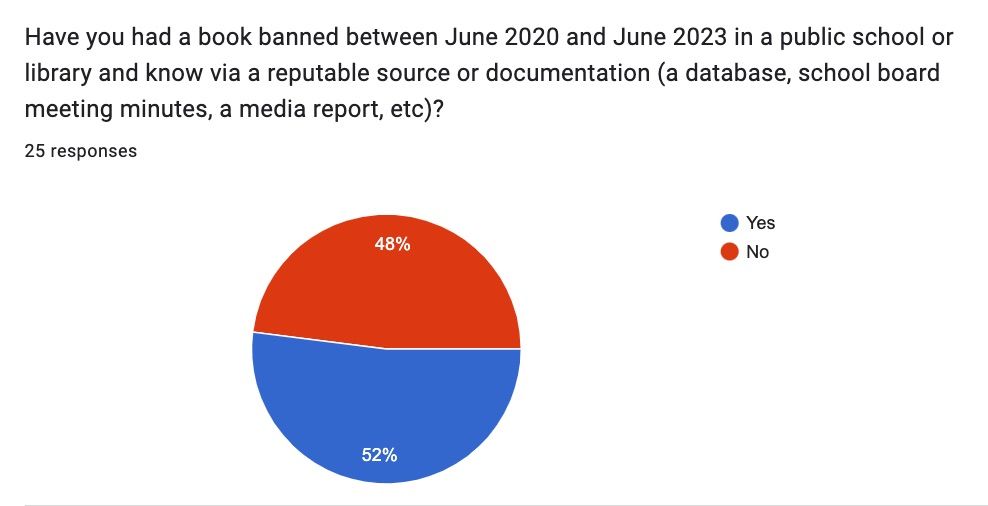
A little over half of the responses came from those who have — and know they have had — a book ban.
Did you have your first book banned in the 2022-2023 school year OR have a new book banned in the same time span?
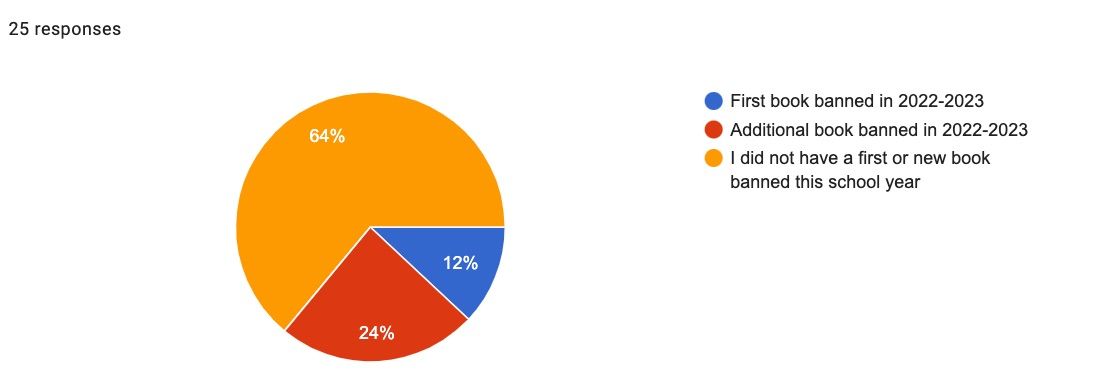
Most authors who took the survey did not have a book banned in the 2022-2023 school year (64%). The remaining either experienced a first book ban (24%) or a ban beyond the first (15%).
What age do you write for? You may select multiple options.
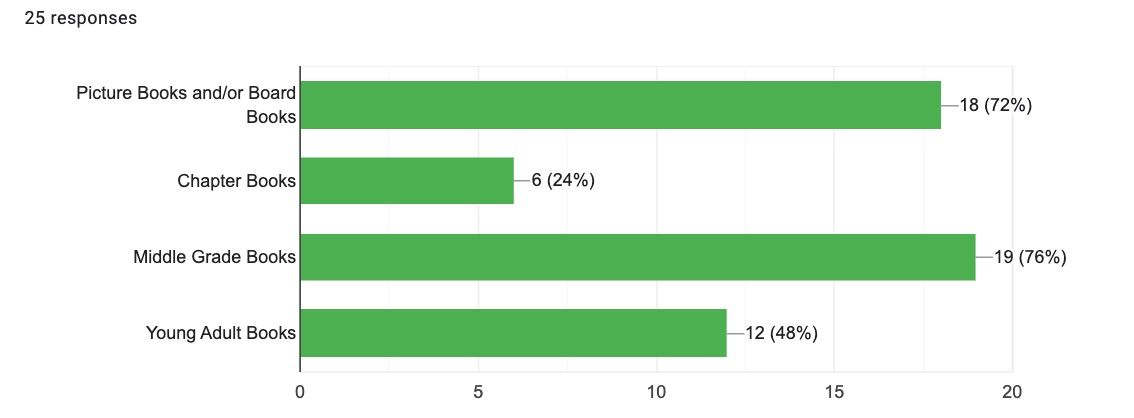
This survey was designed for children’s book authors, and the majority of responses came from those writing picture books/board books and middle grade books. The option to choose multiple categories here shows that many authors wrote across many of these age categories.
Do you write the following? You may select more than one.
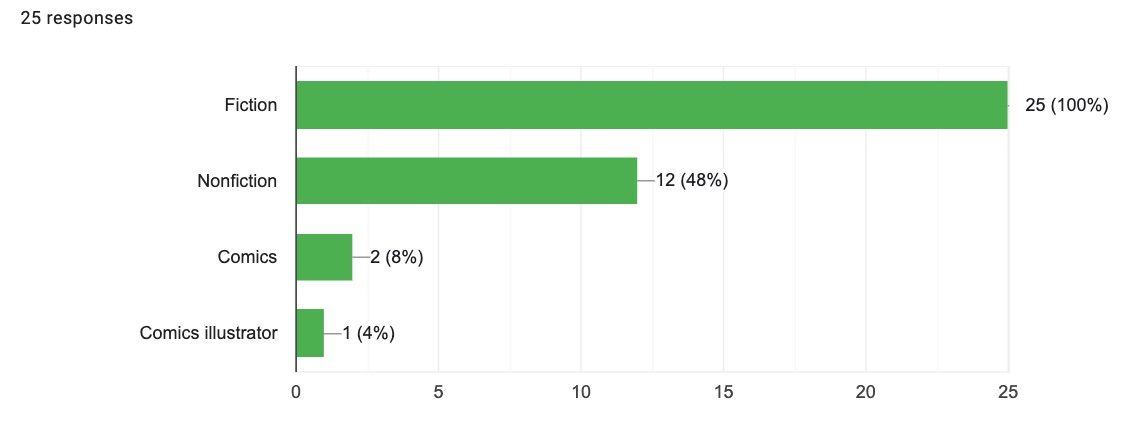
Every survey taker wrote fiction, though some also wrote nonfiction, comics, or illustrated comics.
Do you write on any of the following topics or themes? You may choose more than one option.
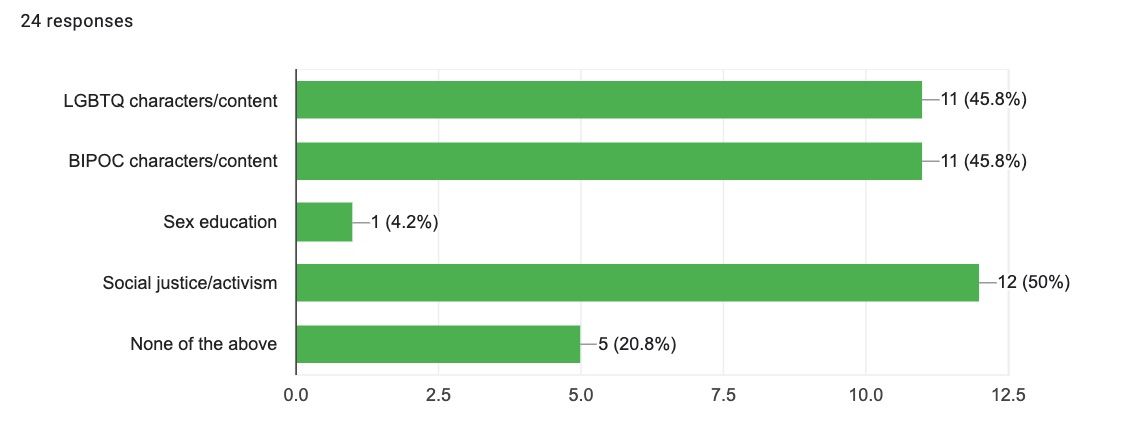
Again, this question allowed for multiple responses. As seen, most writers who responded to the survey wrote topics that are among those being banned, including LGBTQ+ and BIPOC themes and social justice.
Do you believe you have been directly impacted as an author when it comes to increasing book bans?

It should come as no surprise to see most of the authors who responded to this survey believed they were impacted directly. There is response bias here — folks who are impacted want to say that — and there is also the reality that most authors who took the survey write on topics that have been targets of right-wing book bans.
*How* have you been directly impacted as an author when it comes to increasing book bans? You can include several responses, such as “decreased sales, per royalty statements, fewer classroom visits” and so forth.
- Zero schools visits scheduled thus far for the 2023 school year; zero invitations to Pride-centered engagements; two canceled school visits.
- Fewer classroom visits.
- Soft censorship of books, uninvited to school visits, school visits now barely 1/4th of what they were prior to bans.
- I don’t know if I’ve been directly impacted or not, but I worry a lot about shadow bans based on consensual sex scenes in my books, something I crafted with care to show teens healthy relationships. Also, I think more libraries/schools are simply not inviting ANYONE to visit to “play it safe.”
- Dramatically fewer school visits.
- My books only came out in 2022 and I know that at least one of them has not been acquired because of its content and the fact that my co-author has other books that are among the most banned. Book banning doesn’t only include removing books from shelves. It means not buying those books in the first place out of fear they will be challenged. I also have received zero invitations for paid classroom visits despite one of my 2022 books receiving a major award.
- Fewer invites for author visits, more visit inquiries that don’t pan out because “we’ve decided to go in another direction” or “we decided to invite a different author this year.”
- Fewer school visits, decreased book sales, increased social media cruelty.
- Decreased sales.
- Decreased sales, fewer requests for school visits.
- Huge decrease in school visits.
- Far fewer classroom visits. Pride month is usually very busy for me — this year, almost no visits.
- Fewer school visits, modest decline in sales.
- Disinvited from two high-paying school visits. Not sure about sales. Won’t see those royalty statements for a while.
- School visit cancellation due. Also upcoming school visits way down from usual.
- Decreased sales, fewer school visits.
- Decreased sales, far fewer author visits. Libraries and schools are trying to avoid controversy and/or the dangers that are now more commonplace thanks to the current political climate and recent book bans. My picture book was also a very popular title at drag queen story hours, which are also under attack.
- Fewer classroom visits.
In the 2022-2023 school year — July 1, 2022-June 15, 2023 — did you have any invitations for school visits, classroom visits, or library visits?
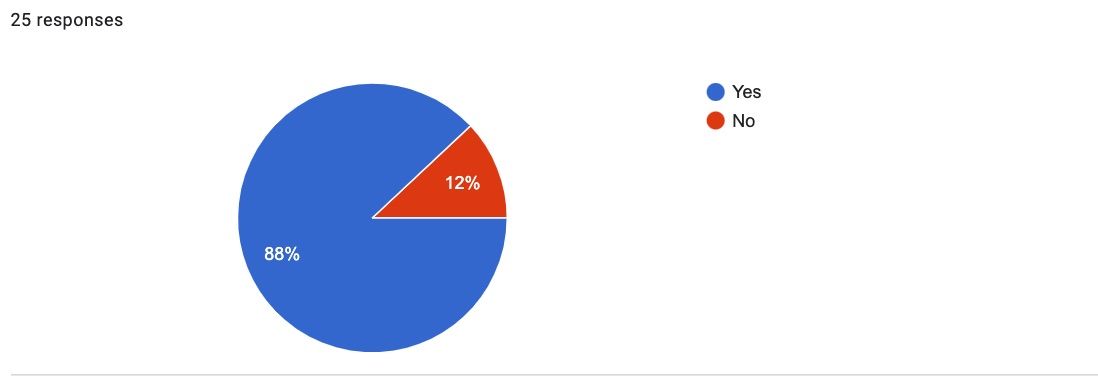
Most authors — 88% — had at least one school visit or library visit invitation in the 2022-2023 school year.
In the 2022-2023 school year — July 1, 2022-June 15, 2023 — did you have more or fewer invitations for school visits, classroom visits, or library visits than you did for the previous school year — July 1, 2021-June 30, 2022?
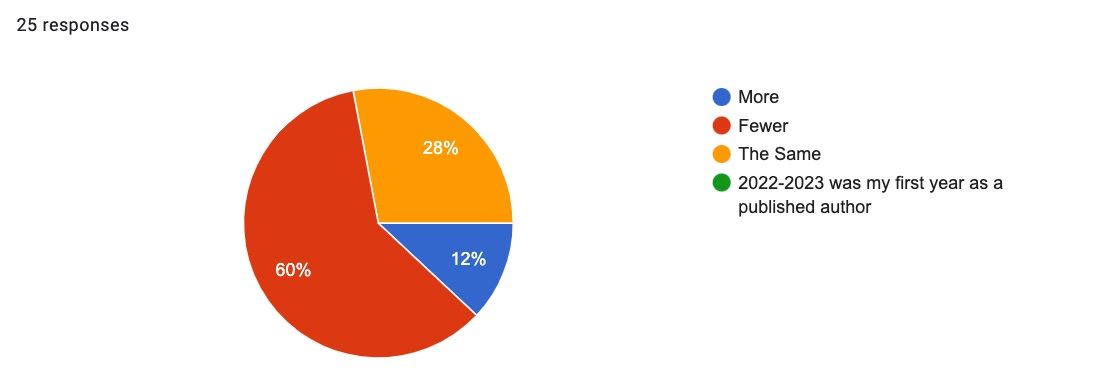
Most authors had fewer visit invitations for the 2022-2023 school year than the school year prior (60%). Twenty-eight percent of authors reported the same amount of invitations, while 12% reported more — combined, those still reflect a majority of authors having received fewer invites.
For authors who have published prior to the start of the COVID-19 pandemic, think back to the July 1, 2018-June 30, 2019 school year. How does your slate of event invitations at schools and libraries compare to the last “normal” year?

Because the 2021-2022 school year was still not “normal” compared to pre-COVID years, this question looked to compare invitations prior to COVID with now. It comes as little surprise most authors have seen fewer invites since then, too. Only 16% reported more visits and 4% reported the same number of visits.
If you’ve seen fewer invitations this school year than in previous years, how many fewer did you see (estimate ranges are fine)?
- Dozens of school visits in fall of 2019; 10 or so in spring of 2023.
- I had about 2/3rds the invites this year as the year before and have none scheduled for the next year.
- I’d guess it’s down 25-40% from prepandemic times.
- Half as many.
- I barely had a quarter of school visits I had previously and right now for the first time, I have no school visits on my calendar for the coming school year.
- 5-10. I had been building up to once-a-month major paid events, and then Covid hit. I honestly can’t tell if Covid or book banning had more of an impact, but that’s a significant source of income, gone.
- This school year I had about a third of what they were pre-pandemic.
- Far fewer. Only two in-person visits all year.
- I used to do between 2 and 5 school visits a year before the pandemic, even in years when I didn’t publish a book. The pandemic hit at the tail end of a long publishing drought that ended early in 2022. I had one school visit in 2021-22 but nothing since and no forthcoming invitations as of yet despite aggressively getting the word out.
- I’m honestly surprised to count up the numbers and see how even they’ve been from year-to-year. This year has *felt* like fewer visits, but maybe that’s because we’ve had more inquiries that didn’t pan out?
- It’s been a steady decline from 60-70 a year to 20-30 to 5-10 and to currently having 0 scheduled.
- Many schools are still more comfortable with virtual visits.
- I used to get several requests per week. Now I get maybe 1 a month.
- At least a 50% reduction, maybe more.
- Focusing on Pride month specifically, I usually have at least 10 days of school visits. This year, I had two, both from schools where I had personal connections.
- My elementary school visits have almost completely dried up. My middle and high school visits have declined by about 50 percent.
- This is hard the gauge. The pandemic changed school visits first. Then we came out of the pandemic directly into this fascist movement. I have also seen an increase in schools that want me to do free work BECAUSE I’m banned. Which is a weird thing, but they seem to think I will speak for free because I am experiencing something terrible they want their students to learn about?
- Down about 90% at this point.
- Approximately 20%.
- I’ve gone from nine or ten a year to zero.
- About half or more.
How do invitations to schools and libraries for the upcoming school year July 1, 2023-June 30, 2024, appear to be, compared to the 2022-2023 school year?
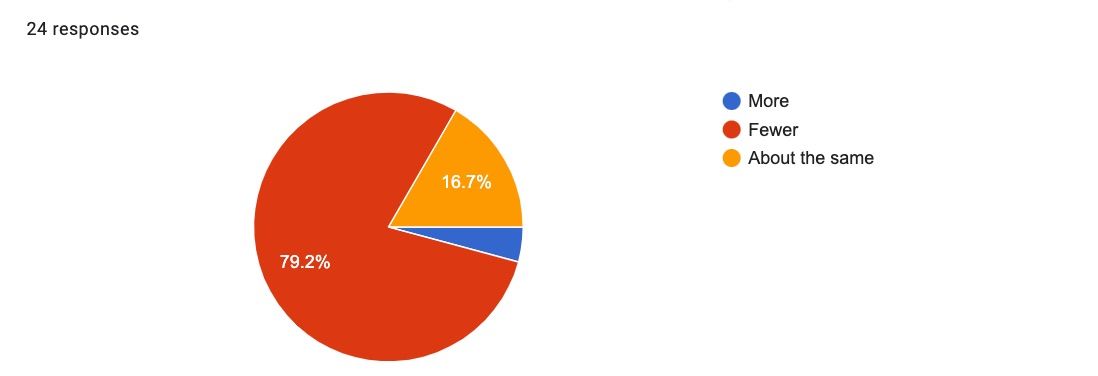
School and library visits are often done well in advance of their anticipated date, sometimes up to a year. Authors are already reporting fewer invitations, with 79% already noticing a difference between this coming year and the previous.
How do invitations to schools and libraries for the upcoming school year July 1, 2023-June 30, 2024, appear to be, compared to the July 1, 2021-June 30, 2022 school year?

And in comparing event invitations to the 2021-2022 school year — still one with book bans but fewer than in 2022-2023 — 71% of authors still report fewer invites for the coming year.
How do invitations to schools and libraries for the upcoming school year July 1, 2023-June 30, 2024, appear to be, compared to the July 1, 2018-June 30, 2019 school year?

Compared to the last “normal” school year pre-COVID and pre-book banning surge, 88% of authors note a decrease in author visit invitations from schools and libraries compared to the upcoming year. There are several factors likely contributing to this. In addition to book bans and changes in schools/libraries due to COVID, budget challenges and being unable to plan for the unforeseen in advance — even more so than prior to COVID — are reasons why there may be such a stark difference.
Think about the invitations to school and library visits you received in school year 2022-2023 as they compare to the previous school year, 2021-2022. How many did you accept?
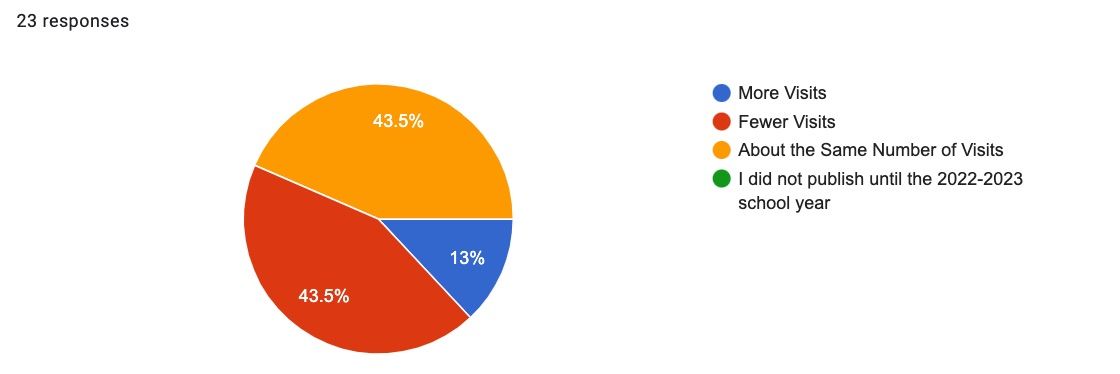
This question flips things a bit, asking authors how their acceptance of invites may have changed. Exactly the same number of authors accepted about the same number of visits in the 2022-2023 school year compared to years prior as did authors who accepted fewer. Only 13% accepted more visit invites. More details and nuance to these answers are reflected in the following questions.
For presentations you have accepted invitations for in the 2022-2023 school year, have you been required to send a copy of your presentation in advance in order to have it reviewed and/or approved for content?
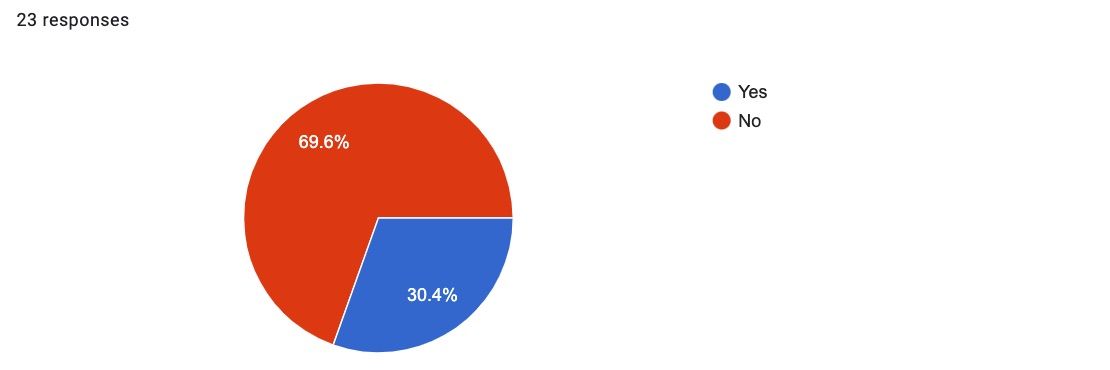
Although most authors did not need to have their presentation in advance of their visit for approval, 30% did.
If you answered “yes” above, please share any details about the experience here — or how common it has become.
- Several times, I’ve been asked to provide slides in advance. Once, I was asked specifically not to mention my picture book that is about creative clothing choices (non-gendered).
- Several schools have asked to be shared presentations to make sure there is nothing problematic. One school asked that I take out the book banning section.
- The school was apologetic and approved the slides but I also had to sign a statement about presenting “both sides” of any controversial topics and district admins were at every talk and workshop I did that day. Everyone was supportive but very nervous.
- I was asked several times to send my presentation early “to make sure the technology was all set up.” I declined and no one balked. Ostensibly, these requests were not to review content, but I feel like they likely *were*. One district requested my presentation to review content, I refused, they insisted, my booking agent sent a very bare bones outline (“she’ll talk about her life, her books, how she became a writer, how students can learn to embrace revision” Or something similar). This bare bones outline was accepted. I did not send any slides.
- This has been happening more and more. When it does, I ask who will be reviewing it and how will it be shared.
- Lesson for a writing workshop was reviewed by host teacher.
- This only happened about half the time but that’s a lot since that had NEVER been requested before.
Use this to elaborate on your decision-making process for this school year when it comes to school and library visits.
- After my book won several big ALA awards in Jan 2022, there was a big uptick in requests for school and library visits. I decided to accept as many as I could since I wasn’t sure how long I would be “in demand” after the 2023 ALA awards were announced. I also thought more about whether certain schools/libraries were in safe/progressive areas. Although I haven’t encountered it yet, I wouldn’t accept any invitation if I was required to send a copy of my presentation in advance for approval.
- I have been pursuing school visits ever since my long publishing drought ended and will accept anything that pays reasonably because I need the money and appreciate the chance to meet readers.
- If a school signs my contract, I’m happy to visit! If I have any qualms about censorship beforehand, I trust my booking agent to assess the vibe. I know that doesn’t sound very scientific, but so far it’s worked. Often I get worried or have a pre-angry knee-jerk reaction to the tone of an email, but so far my booking agent’s sense of the vibe has eased me, and she’s always been right.
- It makes for much more challenging cost-benefit decision-making.
- I accept all invitations provided they pay my usual fees — but the last few months have been very quiet and I’ve had no invitations yet for 2023-24.
- I would like to do more because I have a new book. However, I sense that teachers are nervous. I am a BIPOC author who writes nonfiction and fiction and I worry that my nonfiction picture book may be a cause of concern for some, even though it is about a scientist.
- When I correspond with hosts, I ask them to describe the curricula to me so that I know what the students are studying. Hosts are aware that I’ll be talking about the research and writing process for all of my books, and that includes the banned book. I haven’t had a visit canceled; I’m simply — and not so simply — getting the number of visits I’ve had in the past.
Have you seen a difference between PUBLIC school visit invitations and PRIVATE school invitations? If so, feel free to comment here.
- Yes the few I have had have been mostly private.
- For the next school year, for the first time in my career, I have zero visits booked, so I probably won’t skip any of any invitations come!
- Although I haven’t booked any visits, I’ve noticed that private schools seem more amenable to my pitches. However, my lone 2021-22 visit was a public school.
- I have had a few private school invites fall through recently, and I’ve also had a few private school inquiries *because* they want a “diverse” author to present.
- Yes, far more private school inquiries.
- Yes. I’m seeing more private school invitations now and fewer public school invitations overall.
- During tour in September 2022, the only schools that would have me were private schools. The book was MG, has done quite well, but it’s about intellectual freedom and independent booksellers said they couldn’t get any schools on board — even in places that used to pack author tour schedules. This was a huge difference for my publisher. Other authors toured just fine. And my book isn’t that controversial.
What is one thing you’d like the general public to know about author visits and how they play a role in an author’s income and career?
- I decided to focus on writing full time because my income from school visits was enough to keep me afloat. Without that income, I don’t know how I’m going to continue to make a living, and taking a day job will make it much harder to maintain a career as an author.
- Most authors I know, myself included, rely on the money earned at school visits for our income. Until the pandemic, that income felt far more reliable than the money earned from advances and royalties.
- Author visits are an important part of an author’s income since they provide cashflow between royalty payments. Authors and illustrators should be paid for all types of visits, including festivals, virtual talks, school visits, conferences, retreats, etc.
- Because of how low advances are for most mid-list authors and because publishing breaks them out over 2 to 4 years, you can’t make a living as an author without school visits.
- I wish more people realized that we do a service for teenagers, who see a positive career role model in the arts. SO MANY people assume that just by being a New York Times bestseller or published author, I’m (a) rich and (b) only want to do school presentations “for the kids.” Yes, I care about kids. I also care about paying my bills.
- Author visits were essential to me financially and vital spiritually. Connecting with young readers around the power of story and inspiring their own reading lives is fuel that keeps me writing and it’s very sad to see those connections disappear. And financially, losing this income stings.
- School visits that connect authors with readers inspire young people and help to create lifelong readers. This is especially true for young people who feel left out because of who they are. I’m a neurodivergent author, and I’ve seen the joy that neurodivergent kids express when someone with their lived experience is the invited speaker. I can pick up other work to fill the income gap, but if kids don’t see authors who can inspire them, nothing else can fill that gap.
- Author visits can be a HUGE source of income. They also increase book sales, which then encourages publishers to publish more of our books. Certainly, authors have built successful careers without school visits, but for many of us, this is our true bread and butter. This is how we buy groceries. Plus, it’s so, so important for us to be able to interact with our readers. I think this is particularly true for middle grade authors. School visits allow us to stay in tune with our audience, and these visits allow our audience to see us as approachable humans rather than unreachable famous people.
- School visits are a much-needed income stream as book advances overall are down. I have needed to start other income streams as a result of losses in this area.
- For me, author visits normally account for about 25% of my income.
- Author visits are a significant portion of my income and they are also a significant influence on my creative work. When visiting schools and talking with kids, I learn what’s on their minds and get ideas for future books.
- Publishers don’t pay authors enough to live. School visits are a way to afford to be able to write books. I have been in this business a long time and this is still the case, and I wish the general public knew that we don’t make a lot of money on books.
- Author visits significantly supplement an author’s income and are instrumental for sparking interest in reading!
- Author visits are my main source of income. It’s important to note, as well, that with the astronomical reliance on social media, a lot of publishers have been heaving a lot more responsibility on creators to do their own promotion. I’ve personally had to make my social media accounts private because I’ve received harassment in the form of both private messages and public comments. So self-promotion is pretty much out at this point. I can’t do author visits AND I can’t self-promote via social media.
- Yes, such visits are important to my income.
How much of your annual income comes from school and library visits?
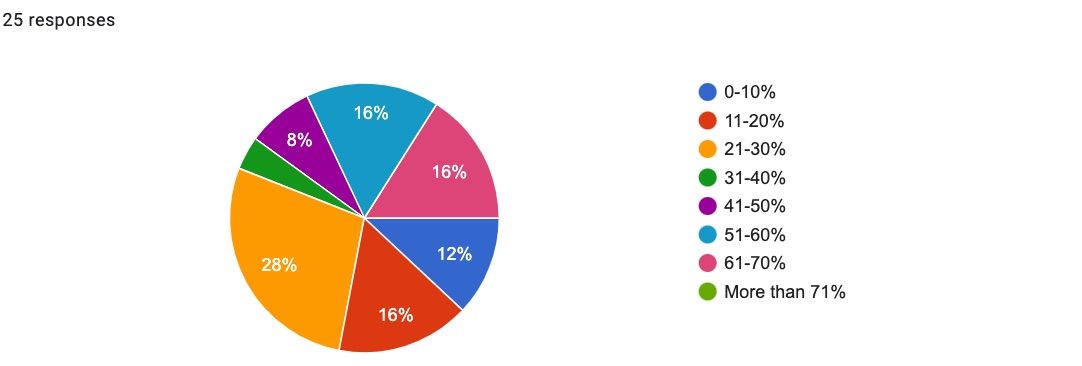
Although all of the other questions in this survey are important and worthy of taking the time with, this might be one that is most striking for those who do not work as authors. Most authors earn at least 1/4 of their annual income from school and library visits. The loss of one visit is tough. The loss of several visits is downright devastating.
A full 20% of the authors in this survey earn over 50% of their income from visits.
By how much, to your best estimate, did your income decrease in the 2022-2023 school year due to fewer school and library invitations?
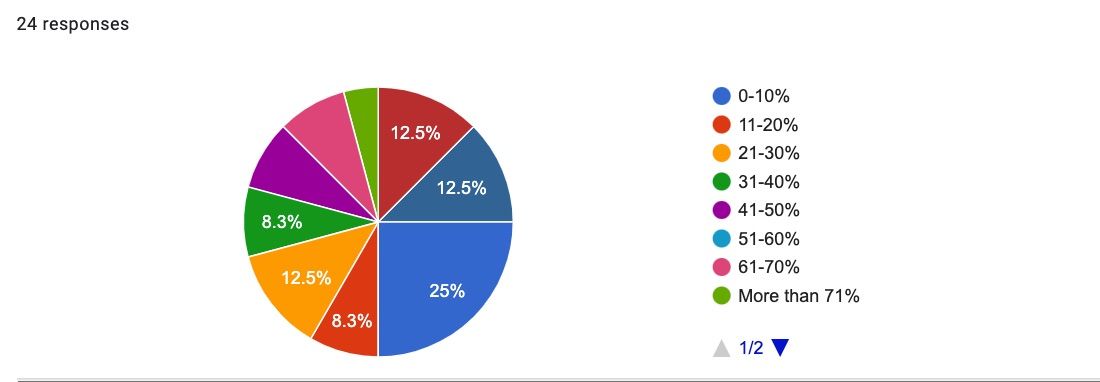
Note: the 2 other options in the pie chart are “Stayed the Same,” in rust red at 12.5% and “I did not have fewer invitations” in deep blue, 12.5%)
Half of the responses indicated losing more than 10% of their annual income last year due to lost school and library visit invites. About 42% of authors lost more than 20% of their income.
This is an open space to discuss trends in income you’ve seen in relation to increasing book bans and their impact on school and library visit invitations.
- An incredible, devastating chilling effect.
- Here’s a thing no one’s talking about: the rich schools — public or in wealthy cities? They’re not really hurting. They’re still inviting authors. It’s the poor schools, Title 1 and those who used to use grants to fund author visits that have stopped. It’s the poorest kids who aren’t getting author visits and who aren’t getting books, because those teachers are already exhausted and using their resources to fight book bans or who can’t afford to “waste” time writing grants that will result in protests.
- I’ve heard from librarians that would love to invite me and other LGBTQ authors but simply cannot in this environment with these school boards and the risks of the laws in their states.
- In my case, I picked up other work (editorial consulting, translation, teaching writing) to make up the lost income, but school visits are a special experience for the students and me.
- I’m fascinated by the numbers as I look them up. They are quite different than I imagined they would be. I didn’t think that this school year would be more profitable than last, but it has been. I think — well, I know — this is in part due to raising my rates. I also think this is, in part, because, once a school inquires and wants me to visit, we’ve been working hard with them to get other schools in their district or in their general area to join in. So, I’ve visited fewer cities this year, but more schools during each visit. Also, I’ve done a lot more visits to just one or two classrooms, or one grade level, rather than entire schools.
- Based on the decrease in requests I will make significantly less money in the forthcoming school year.
- I am seeing elementary school visits disappear entirely, which is startling since my banned book is YA and I have a wildly popular picture book series. I’m also getting fewer out-of-state bookings. Bookings from red states have almost entirely disappeared.
- I honestly think these numbers have as much to do with changes due to the pandemic vs. just book bans. The pandemic changed a lot of things and teachers came back to school already more flexible, so when fascist school board policies were adopted, it was the same kind of “okay whatever” mindset that was easy to tap in them because they’ve been rolling with things since 2020 and are utterly exhausted.
Do you anticipate your income for 2023-2024 to change because of book bans and their connection to school, classroom, and library invitations?
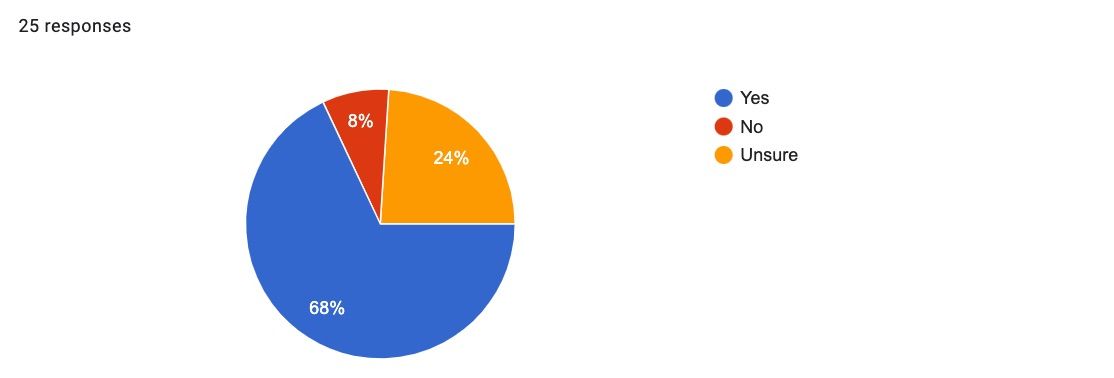
The vast majority of authors anticipate their income in the coming year will be impacted by book bans and the chilling effect on school and library visits.
Use this space to include any thoughts, fears, or feelings you have about the upcoming school year and its impact on your income and career as an author. Please stick to invitation-related comments.
- Despite numerous awards, over a dozen titles for various ages, and almost a decade of experience as an educator, I have received zero invitations for the 2023 school year, and it is undeniably linked to the banning of my books in individual schools and entire states.
- I haven’t been invited to do any school visits in the 2023-2024 school year aside from an invitation that was first sent in 2022. (I couldn’t make it this past school year, so it was rescheduled to next school year.) I’m worried that people are not inviting me because of the book bans and also because I’m no longer the most recent ALA award winner.
- I’m worried this will be the new normal. It’s easier to just not have an author visit or to not buy a book that they think will be challenged.
- Also, I’m extremely disheartened that there are a handful of people “on the circuit” who don’t seem impacted at all. I’m friends with a white, male, straight author, and he’s fully booked for next year. I also know of a white, straight, female author who writes picture books that don’t include social issues, and she’s fully booked for next year. No shade to these people — they have niches and they’ve not changed to fit a market; they can’t help who they are and they’ve been writing what they write for years. But also…they’re “safe.” And there are a lot of voices that aren’t being heard because schools and libraries are opting for “safe.”
- As of this time, I’ve no invitations or planned visits so I will have to find other ways to make up that income difference. The money side stinks, but missing the chance to meet young readers where they are and get them excited about reading stinks even worse.
- I think the impact is more on my career as an author because I feel isolated from my readers. I can teach adults and do editorial work to make up the income, but it’s not as inspiring as working with young people.
- I think educators are exhausted, having to deal with all of this. It’s already *so* much work to plan author visits that adding more stress and hassle (or even just more perceived or feared stress and hassle) will likely curtail many invites. I also think that laws in places like TX, FL, MO, etc have educators frightened for their jobs.
- I’m concerned I won’t make enough money next year based on decreased requests. I had just started to build my school visit career and it was just paying off. Now I feel I’m back down to when I just started.
- I am concerned I have received fewer invites for the upcoming school year because I am part of the LGBTQ community, even though I don’t write books that are LGBTQ centered.
- My biggest concern is not for myself, but for the students. I always charged as low a rate as possible because I mostly speak in very low-income areas and know what it’s like to grow up in poverty. Knowing the book bans and general anxiety toward authors and books in schools is damaging children’s access to books and authors is heartbreaking.
- I’m not counting on income from author visits going forward; my books are being challenged everywhere and labeled as “controversial” due to LGBTQ themes.
- With a new book coming out on a controversial topic, I have no idea what to expect in terms of school visit bookings. The new book is very much on-brand with my previous work, which means it *should* result in a large number of bookings. But I fear that won’t be the case or that I will only be invited to affluent schools in blue states where my presence will be uncontroversial. Here’s why this hurts: At every school visit I do at a middle or high school, there is a cluster of kids waiting for me at the base of the stage, eager to talk to me about my work and how it impacted them. These are often the misfits and marginalized kids who are seeking affirmation and connection at a school where they don’t often receive it. My heart breaks when I think of them not getting a chance to talk to an author — any author — who can provide that for them.
- I have hope that invitations will increase. I am known for being a very good speaker. But I predict I will be asked to speak at more conferences, etc. than traditional school visits now that a few of my books are on the Moms for Liberty lists.
- I believe that right now we’re seeing “gray censorship” — that is, schools are not booking author visits not because there has been a problem, but out of fear that there MIGHT be a problem. Administrative caution (or, as I prefer to think of it, Administrative cowardice) is depriving students of something that I know for a fact can be a life-changing experience. I have had numerous post-visit reports of a non-reader who has become a reader because he or she was so excited by my presentation and read their first book as a result!
Use this space to include any thoughts, fears, or feelings you have about the upcoming school year and its impact on your income and career as an author when it comes to book sales.
- I can no longer rely on any income streams from visits. It’s been evident since Covid; that’s not money I can count on.
- I’m just not sure. Wish authors had more access to real-time sales data.
- I know my book sales are lower than they should be because of book bans and school and library fears of backlash. My books address racial justice, contain LGBTQ+ characters, and touch on social issues that include book banning and censorship.
- I’ve noted a lot of YA authors moving toward publishing for adults, and I wonder if this is due to so many book challenges. I also wonder if this is translatable to PB and MG writers — can we pivot some of our writing time in order to diversify the ages of our audiences, and our income streams? I also worry that at some point the zealots will get violent. I fear for the safety of authors on the road, authors who might get doxxed, etc.
- My books are focused on diverse characters and there has been a sharp drop in sales compared to previous years. If that trend continues I might not be making much in royalties. This might affect future advances or whether I can even sell a book.
- My sales are primarily to schools, so I anticipate a strong decline in sales. While I have not heard of any bans affecting my books yet, they contain LGBTQ characters and qualify for banning under several new state laws.
- My worry is that schools will self-censor, not buying books likely to cause parental objections and more work for the school. If this affects sales, which it will, I am afraid we will start seeing publishers be less likely to acquire these books. I’m hoping I can publish for adults because I’m not convinced I’ll be able to keep publishing LGBTQ books for kids.
- With a new book coming out on a controversial topic, I have no idea what to expect in terms of book sales. My new book is very much on-brand with my previous (bestselling) work, which means it *should* do well. But I fear that it will be quietly banned in every red state, with teachers, librarians, and book buyers concluding that the potential for blowback simply isn’t worth the risk of ordering it. If that’s the case, I don’t see how I can continue making a living as an author and frankly, I’m finding myself considering a return to the adult side of publishing, where I got my start, and where censorship has less impact on book sales.
- I worry that because I’m a Black author I may have fewer invitations because of teacher’s fears. In fact, I offered a free visit to a local school teacher who won one of my social media promotions and after repeated attempts to schedule this free, in-person visit, she still did not find a time for me to come in or get back to me about it! Very disconcerting!
Anything else you’d like to add about the rise of book bans and its impact on author school visit invitations or other related thoughts?
- I try to engage librarians in the schools I visit, and they are eager to share their experiences — for the most part, NJ (where the vast majority of schools I visit are located) has not faced as many difficult banning situations, but you can tell that some are aware that one loud parent can change everything.
- My next book is about a BIPOC person who was also a military veteran and I am steeling myself for it to be banned. I am also trying not to let the rise of book bans dissuade me from writing about certain topics or issues, but it’s hard to keep going when you anticipate people to push back.
- I think it’s important to realize that these bans are truly a war on books and on BIPOC and LGBTQ+ folks (kids and writers, alike). We cannot censor our books to the likings of these zealots because it isn’t about the books. We cannot change how or what we write because nothing we do or say will be accepted by them. Their goal is not to learn more or to grow or to ultimately find their way to acceptance in their own hearts. Their goal is to silence us and erase us. Period. It isn’t about the books. It’s never been about the books. Honestly, I think this might be why I haven’t lost as many visits as other authors. I am out and proud, but many of my earlier books do not have queer content. Educators and librarians will invite me to visit, without knowing I’m gay. When I get there to present, I can feel some dissonance sometimes. The book I’m supposed to talk about isn’t objectionable, but my own personhood makes them uncomfortable. Most of the time, they are not brave enough to ask me to *not* mention my family when I present. They would have to ban me as a person. While this has happened in the past (in soft-censorship, gaslighty ways), I have not experienced it, to my face, this school year. I fear next year might be different, if I get any requests at all.
- For diverse creators, the backlash comes at a moment we were just starting to see increases in sales, visits, and other opportunities. That publishers don’t seem to be doing much to mitigate this underscores how alone we are.
- I have seen an increase in hate mail, death threats, and general bad behavior from fascist / ignorant adults. I have also seen / experienced a rise in random neighbors or others in my conservative town repeating the insane propaganda from the TV. Kindergarten teachers teaching sex, high schools putting litter boxes in bathrooms, both are VERY in the mainstream now and I don’t see enough countering it, and so people who are usually smart and curious seem to believe these things because they heard them. As a literacy expert for 35 years, I think the weak education of our adult population is showing and our main issue now is re-education. But who will do that? Why aren’t regular news channels airing segments on the lies so that these people can see they were duped into believing dumb shit? Without this counter/re-education, we will not be able to stop the fascist movement.


